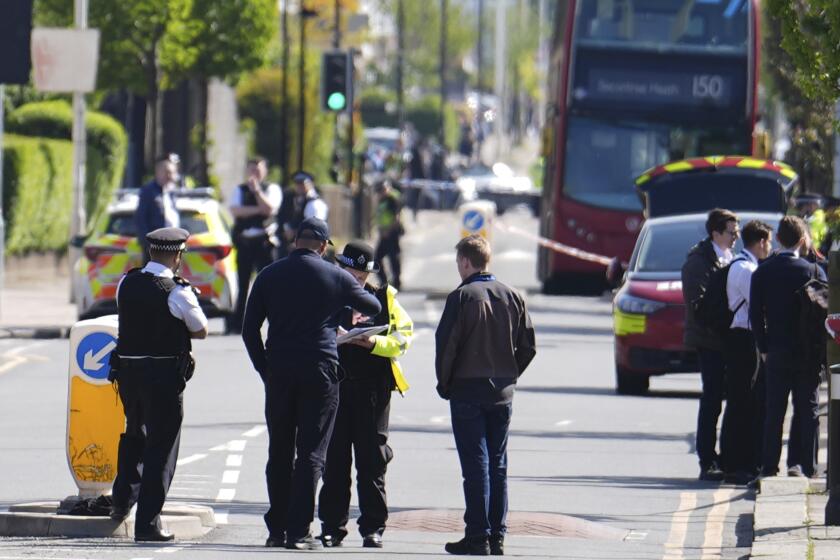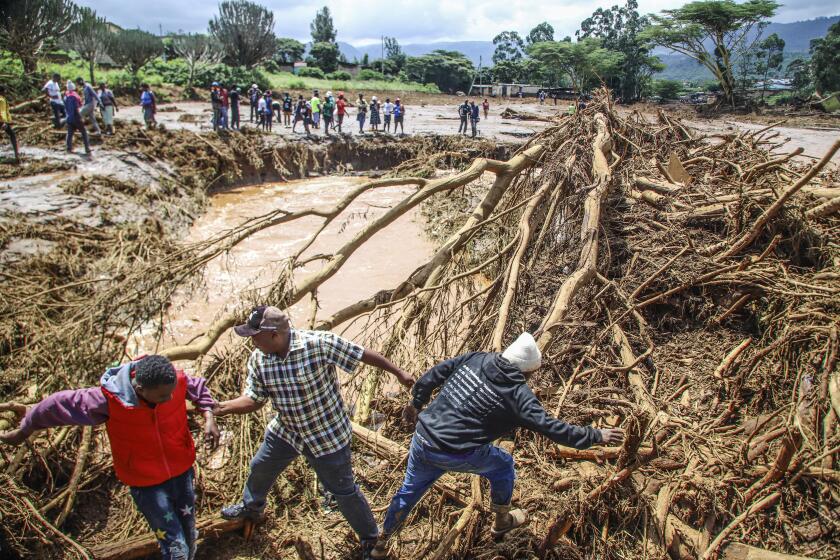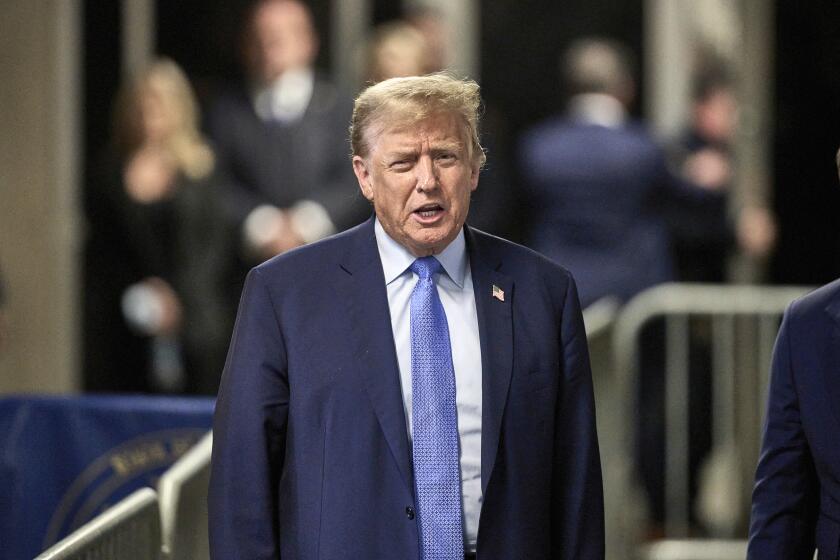Thousands Rally to Back Employees of Czech TV
In the largest protest here since the 1989 fall of communism, about 100,000 demonstrators filled historic Wenceslas Square on Wednesday to support striking public television workers in what speakers called a battle to preserve the station’s independence.
Journalists took physical control of Czech Television’s broadcast facilities just before Christmas. They are demanding dismissal of the station’s recently appointed director, Jiri Hodac, who they say has close ties with the conservative Civic Democratic Party headed by Vaclav Klaus, speaker of the lower house of Parliament.
“We want to be free to say and hear what is true, and not just what is presented to us,” said Vera Vackova, 72, a retired teacher who braved near-freezing temperatures to join the crowd.
Hodac resigned as head of the station’s news department last year after journalists protested against him. They alleged that he fired an anchorman because Klaus had complained about the way the man had interviewed him.
The television employees barricaded in their newsroom have continued to prepare news and other broadcasts. They control satellite broadcasting facilities. But Hodac controls terrestrial broadcasting, on which the vast majority of Czech viewers depend, and cuts off the signal if strikers try to air reports on the controversy. The result has been periodic blackouts for most viewers of the public network’s two channels, despite efforts by Hodac’s side to air its own programming.
Klaus, a former prime minister who guided the privatization of Communist-era state-run industry, is one of the most powerful figures in the Czech Republic and widely thought to have his eyes on the presidency.
Parliamentary elections are due in 2002, and many backers of the striking journalists fear that Klaus’ Civic Democrats want to ensure more favorable coverage by public television. Some also believe that politicians in general want to avoid tough coverage of the corruption that has marred privatization.
“It’s quite clear that the Civic Democrats want to dominate the media, including television, to have better conditions for the next elections,” said Ludmila Lamacova, 53, a language teacher who joined the protest. “Obviously, the Civic Democrats are losing strength, and the strongest media is TV.”
Hodac and his supporters stress that he was legally chosen by a council appointed by parliament and charge that the strikers are breaking the law. But government officials have refused Hodac’s requests that police be used to evict them. Calling their action a “strike” even though they are still working has given the journalists some legal protections.
Sleeping in Newsroom, Taking No Showers
The journalists have been sleeping in the newsroom for two weeks, going without showers and using portable toilets in their working area because they cannot leave without being barred from returning, which has prompted some to charge that Hodac has turned their workplace into a “concentration camp.”
“Even though they prepared a concentration camp for us, we are still working,” Adam Komers, one of the strike leaders, declared in a video broadcast from the television newsroom displayed for the crowd on a large screen set up in Wenceslas Square. “We want free and independent television.”
Journalists and their supporters have also expressed fear that some politicians may hope to break up Czech Television’s two channels, privatizing one of them.
Some backers of Hodac and Klaus say that the rhetoric is badly overwrought and that the protests are politically motivated or fueled by fears that the new management will fire some journalists in a newsroom shake-up.
“The situation here is not such that there could be some kind of Communist or fascist coup,” said 40-year-old Rudolf Benes, who was collecting signatures in support of Hodac. “If every time there is a controversy over a director, we start talking about freedom, then the word ‘freedom’ will be vulgarized. Then, if one day there is a real danger, we won’t be able to mobilize people against someone like Hitler or Stalin.”
President Vaclav Havel, a former anti-Communist dissident and a political rival of Klaus, has spoken out in support of the strikers. Havel said he accepted the legality of Hodac’s appointment but accused him of “violating the spirit of the law.”
“That is very dangerous,” Havel said, adding that the 1948 Communist takeover of Czechoslovakia was legal--but disastrous.
Public opinion appears to be solidly on the side of the strikers. A survey by the Median polling agency found that 89% of respondents said Hodac should resign and 81% supported the striking journalists.
Organizers of the protest claimed that they have gathered 130,450 signatures on petitions supporting the rebellious employees. A rival campaign supporting Hodac claims only 3,000 to 5,000 signatures.
If part of the public network is privatized, some observers say, that might allow control of a broadcasting license to go to U.S. investor Ronald Lauder as a way to settle a bitter dispute involving the Czech Republic’s largest private TV station, TV Nova.
Lauder financed the growth of TV Nova, but his former Czech partner, Vladimir Zelezny, who owns the station’s license, succeeded in taking over the entire operation in 1999. Lauder and Zelezny have been engaged in a bitter legal dispute since then, with Lauder also suing the Czech government for allegedly failing to enforce laws protecting his investment.
Ivan Klima, a prominent writer and former dissident who supports the striking journalists, said he believes government officials want to give Lauder control of another television station to end the TV Nova dispute. “It’s probably the plan of Mr. Klaus to give him one of the channels of public TV,” Klima said.
Government Proposing Legislation on the Issue
Prime Minister Milos Zeman, who also heads the Social Democratic Party, has described the newsroom takeover as a “Maoist Cultural Revolution,” according to Czech media. But his government announced Wednesday that it was proposing legislation to reduce political influence. The changes call for nongovernmental cultural, ethnic, religious, ecological and other groups to nominate candidates to public radio and TV councils, with Parliament giving final approval.
“This law excludes political parties from proposing their candidates,” Culture Minister Pavel Dostal, a Social Democrat who has called for Hodac’s resignation, said at a news conference. He stressed that the draft had been under preparation before the TV dispute broke out “and by no means was prepared under pressure.”
If Parliament approves the bill this month, new councils could be in place by February, Dostal said.
Klaus has called for the dispute to be settled through compromise.
“We can see the solution in a politically guaranteed compromise, which would mean either a joint departure of the main protagonists of the dispute or the finding of their possible coexistence,” Klaus said.
Ever since 1998 elections left a badly split Parliament with no party commanding a majority, Zeman’s Social Democrats and Klaus’ Civic Democrats have engaged in a power-sharing agreement.
Zeman runs a minority government, but Klaus agrees not to bring it down through a no-confidence vote. These two main parties share influence but are a joint target for public dissatisfaction, and Zeman faces difficulties opposing initiatives that Klaus backs.
Rapidly rising in polls has been the Four Coalition, which groups the centrist Roman Catholic-based People’s Party with three rightist parties, united primarily by opposition to the Civic Democrats. Leading politicians of the Four Coalition have supported the striking journalists.
Some of Wednesday’s speakers stressed that voters should remember the current controversy when they next go to the polls.
“I hear the politicians can’t find a way out of this,” prominent television personality Jan Kraus told the crowd. “We have a solution for them . . . early elections.”
More to Read
Start your day right
Sign up for Essential California for news, features and recommendations from the L.A. Times and beyond in your inbox six days a week.
You may occasionally receive promotional content from the Los Angeles Times.






